- Home
- Donald McCaig
Nop's Hope Page 16
Nop's Hope Read online
Page 16
Beverly opened the icebox for an ice tea and poured two glasses. “I’ve never seen weather like this. One moment it’s so warm you can’t wear a sweater and next minute you’re glad of your earmuffs. I hope it doesn’t snow.”
“We came out to see Penny,” Lewis rolled his glass between his big hands, “but we’re no closer to her than if we were back in Virginia. We see her for a few minutes on a trial course and that’s that. Beverly, I think we’ve lost her too.”
When Beverly took his wrists, her eyes were hot. “You listen to me, Lewis Burkeholder. There are things about you, I think could be improved. You have a terrible temper. And if you came to church less often, I believe Preacher Shumway would strike you off the rolls. And you haven’t a humble bone in your body and, there are things you should be humble about. But the first thing I saw when I met you at that fire department dance, thirty-five years ago, was you weren’t going to give up easy. I admired that about you, Lewis. I said to myself then: There are better looking fellows at this dance—Heck, I came with a better looking fellow—but this man will stay with me when things get tough. Now we have driven all the way out here to be with our daughter, Penny, to support her in her bid to be the national champion. She hasn’t got any other kin here, so we are it. You trained Nop and trained yourself so we would have a right to be here, on the same field your daughter is on …”
“We haven’t done much on the field, either.”
“Oh, Lewis, honestly, sometimes you make me so mad. Will you listen to yourself?”
Nop put his head on Lewis’s knee.
“Well, old-timer, what do you think? You think we got a chance?”
Nop’s tail said they did.
“Beverly, I was just thinking. It’s a shame to come all this way and not see Yellowstone. We don’t need to be in Sheridan until next Friday. Why don’t we take a vacation?”
“Do they let dogs in?”
“Beats me. They let bears in.”
This late in the season, Yellowstone’s campgrounds were almost empty and Lewis and Beverly had their choice of campsites. They walked Nop (on a leash, just like the regulations said) among the emerald pools and the geysers and the mud-springs and bubbling springs.
Lewis and Beverly hadn’t taken a vacation together since the year Penny got married, seven years ago. They’d take an early walk and then have a leisurely breakfast and then another walk and lunch and a nap and they’d drive on to a new campground for the night. By week’s end they were both relaxed and smiling and several times Nop noticed them walking hand in hand.
A WEEK AGO, MONDAY at sunrise, Penny had pulled into Bob Brennan’s place, outside Havre on the Montana Hi-Line. Hope sat upright in the seat next to her.
Bob’s wife, Jackie, let the kitchen curtain fall back into place. “That’s her. She must have drove all night.”
Bob Brennan refolded his Billings Gazette. “Yep.” He took time to pour himself a cup of coffee before he stepped out onto the porch. “Howdy, Miss Penny. Cold isn’t it?”
Penny leaned back, hands on hips, and stretched. Hope watered Brennan’s gatepost. “I never saw a place so flat,” Penny said.
“When the northers come down from Canada, it can really blow. Step in and get yourself something to eat.”
“Hope, you stay with the truck.” And she stepped right up to Bob and shook his hand. Funny, she didn’t look so little on the trial field. “I passed through some snow outside Cutbank.”
“Get inside before we freeze our tails off. Jackie’s got your room all fixed up. Our daughter Caroline had it before she went off to the university. I said what was wrong with the college in Havre, but she said she had to go the state university if she wanted to be a psychologist. Told her she’d have all the neighbors for customers. If she could figure why we put up with ranchin’, she could make a fortune. Invent some pill—‘here, take two’—and get rid of this ranchin’ fever.”
“I thought ranching was supposed to be romantic.”
“Ma’am. I ranched the romance out of the son-of-a-bitch, years ago.”
Brennan was a big man, soft around the middle, with a cowboy’s skinny behind. Two years ago, he’d been at the Winterfest in Bozeman, Montana, when Bill Berhow put on an exhibition with his Border Collies. He bought a pup from Bill, named it Shep, and now, as they sat around the kitchen table Bob Brennan unfolded Shep’s pedigree. Penny showed no more interest in it than Shep did. At Fort Collins Bob had offered Penny $500 for a week of private lessons. He was halfway surprised she’d showed up, but when they took Shep out to the horse corral where Bob kept a dozen practice ewes, Penny was all business. In ten minutes, she had that dog going better than Bob had ever seen him and ten minutes later, when Shep decided to take a bite of one stubborn ewe, Penny reached out with her shepherd’s crook and tapped Shep, just tapped him, on the nose and Shep stopped. “Oh,” Shep said, “Something new is required.” Bob heard Shep talk, clear as a bell. He wondered why he hadn’t heard him before.
That week, every day, they worked Shep in the corral, and morning and afternoon, Bob and Penny rode out over the prairie, and soon as Penny spotted a flock grazing on some distant mesa, Penny sent Shep and thirty minutes later, sometimes forty-five, the sheep were at their feet.
Bob Brennan went on to become a fair dog handler, and he and Shep won several open trials, but he never forgot the slight woman working his dog, better than he could, out in the middle of nowhere; woman, dog, sheep moving with great precision, and she never repeated a request (Bob Brennan couldn’t call them commands), and she spoke so soft—just Penny and Shep and the sky, stretching from Canada to Mexico, lighter blue at the rim than in the bowl overhead. Shep never forgot it either.
The second night, Penny moved out of the bedroom back to her camper. She said that sleeping indoors made her uncomfortable, but it wasn’t that, it was the ruffled girlishness of the room that oppressed her, like someone was trying to squeeze her into a jar. “It’s not your house, Jackie,” Penny said, “it’s me.”
“You got enough blankets?” Jackie asked. “It’s below freezing.”
In years to come, Jackie and Bob would talk about their guest. Bob would try to explain what happened out there, him and Penny and Shep and usually ended, “I guess you had to be there.”
Jackie never would say exactly how she felt—lucky, was part of it; but also ashamed, for some reason, like her life, her ranch, her two kids, hadn’t amounted to much, like somehow she might have done something different with her life, something bright and cold and beautiful. Jackie was glad when Friday morning came and Penny left for Sheridan.
Where Ransome Barlow spent the week of the Buffalo trial and the Finals isn’t important to our story.
When he pulled into the Equestrian Center at Sheridan, Wyoming, on September twenty-fourth, his entourage of cowboys and down-at-the-heels dog handlers hadn’t changed, but Ransome wasn’t drinking anymore, not a drop.
NATIONAL HANDLERS’ FINALS
1st Qualifying Run
September 25, Sheridan, Wyoming
Judge: Stuart Davidson, Dunoon, Scotland
75 Open dogs went to the post
1. Penny Burkeholder
Hope
93
2. Bill Berhow
Nick
92
3. Candy Kennedy
Sage
92 (Decided on outwork)
4. Ransome Barlow
Bute
90
5. Lewis Burkeholder
Nop
88
THE BANNER over the turnoff to the Sheridan Equestrian Center said: WELCOME TO THE FIFTEENTH ANNUAL NATIONAL HANDLERS’ FINALS SHEEPDOG TRIALS. Four o’clock, Friday afternoon, a few handlers gathered in the clubhouse. Others walked the flat trial field. Dogs visited one another among the rows of motor homes. Hope came over to Nop, tail awag, and as befitted the dignity of an Older dog, Nop waited until Hope was close before offering a modest wag of his own. The Bighorn Mountains bulked u
p behind the field like a shy but determined wall. The lines across the face of the mountains looked like roads, but they were irrigation ditches, passing last winter’s snowmelt down to the plains below.
When Hope was just six months old, Nop used to take him by the collar and roll him over in the grass while Hope growled fierce as he could. Nop had missed Hope at home, wished there was another dog to walk with and chase foolish squirrels into the air. How does a squirrel get from tree to tree?
“How art thou, old man,” Hope bowed and yawned.
Nop inspected the course, self-importantly. “Thou hast learned nothing since last I dragged your collar,” he said.
Hope grinned at him. “Tomorrow I shall work woolies. Tomorrow and the day after. Oh, I am a fine stockdog.”
Nop grumbled, “There’s more to life than that.”
“What? What more pray? Me and my woman, we go out, we make the woolies dance. She is wise. She says good words when we talk.”
“It is unwise to talk to them,” the older dog grumbled. “When we talk, they learn more about us than is proper.”
But the young dog wandered over where the pipe was flooding into the irrigation ditch below the clubhouse and, ears cocked, inspected the spot where the earth squirted water.
The trial organizers had laid out finger food in the clubhouse, some handlers hung on the cash bar, some inspected the art works hanging for a silent auction, while others ate on the deck, admiring the mountains.
“It’s so pretty out here,” Beverly said.
“Are you cold? Do you want to go inside?”
Penny slapped a taco on a paper plate, got a cup of black coffee, added four packets of sugar and came out onto the deck.
“Would you fetch me my sweater, Lewis?” Beverly asked.
Enroute to the motor home, Lewis spotted Hope and Old Nop snuffling along the bank of the irrigation ditch, and as the younger dog effortlessly vaulted across, Nop hesitated. Lewis winced.
Beverly loomed over her daughter until Penny raised her eyes. “We haven’t talked,” Beverly said. “Don’t you think we should?”
Though Penny hadn’t taken three bites, she tossed her plate in the trashbasket and wiped her hands.
The way Penny brushed the hair out of her eyes—when had she become a wife, mother, widow? But Penny’s gaze was as bleak as those blue mountains. Beverly hadn’t seen that gaze before. “Talk doesn’t help,” Penny said.
“Baby”—Beverly hadn’t meant to say that—“can’t we try? It makes us heartsick, me and your Daddy, to see you so alone.”
Penny managed a shakey grin. “So long as I got Hope, I’m not alone. You know how far we come, in just one year? Oh I’ve heard people talking: Hope’s too young, too inexperienced for the pressure. If I was a man, they wouldn’t be talking that way.”
“Penny …”
“I’m glad to see you and Daddy here. I didn’t think you’d come. I never meant to hurt you.”
“Honey, we were hoping you’d come back to Virginia with us after the Finals. Lewis says there’s no more trials to speak of until the new year.”
“No more big trials, maybe. But there’s clinics and private lessons.” Penny’s voice lowered. “Ma, I just can’t bear to live my old life. Me and Hope are building a new one.”
Beverly was glad it was getting dark and nobody could see she was crying. She plunged into her purse for a tissue. When a voice said, “Hello Penny, you’ve done a job this year,” Beverly turned to the newcomer with relief, and Penny introduced them.
Oren Wright was quick to touch the brim of his Stetson, say “ma’am,” but his eyes were on Penny all the time, and Beverly felt a twinge of jealousy for the child that had once been hers alone. “I came to offer you a job,” he said.
Penny produced a wan smile. “You came all the way out here to say that? You might have telephoned.”
“And you might have told me no. My Uncle Nick had several of those frequent flier passes. So long as I answer ‘Here Sir’ whenever the airline asks which passenger is Nick Wright, I can fly for free. And I asked for the handler’s rate at the Holiday Inn, and they gave it to me, just like I was a sheepdog champion. I don’t know if you been to that Holiday Inn yet, but they’ve got a waterfall right in the lobby. The Holiday Inn’s where they’re going to have the Handlers’ Banquet Saturday night. You all buy your tickets?”
Beverly said, “Will you come with us, Penny?”
Penny closed her eyes. “Ma, I hate those things.”
Beverly stayed quite still. Didn’t move a muscle.
“Sure,” Penny said, “You bet. I’ll buy my own ticket. Now if you two will excuse me, I’ve got to find Hope before he wanders off.”
Beverly murmured, “Dear God, I am so frightened for her.”
“That girl’s tougher than she looks,” Oren said just as softly.
“I’m afraid she’s not,” Beverly said. “And she hasn’t got a soul to care for her except a dog.” She put on a bright smile and said, “Mister Wright, my husband has got off somewhere to fetch me a wrap. It certainly gets chilly here when the sun goes down. I wonder if you’d be good enough to bring me a, oh, a bourbon and Coke would be nice. I haven’t had one of those in years.”
And when Lewis came back with Beverly’s jacket—he hadn’t been able to find her sweater—he draped it over her shoulders, and took a sip of her drink, said, “Beverly!”
“Well, this nice Mr. Wright was kind enough to get it for me. Lewis, he runs three thousand ewes. Penny lambed out for him last spring.”
Penny ran well the next morning. On spooky sheep, Hope never set a paw wrong. Nop’s sheep were more difficult, but the old dog stayed back off them, never forced the pace, and Lewis finished the course with seconds to spare.
None of Ransome Barlow’s roughneck buddies finished in the top ten—only one scooted into the top twenty. They bitched about the judging and drank beer.
That night, Ethel Harwood took Lewis and Beverly to dinner at the Wagon Box Inn, which was near the site of an 1870s Indian fight. Like most good restaurants in Wyoming, the Wagon Box was a steak house, log walls, big solid tables, prime rib if you didn’t like steak.
Ethel had her gin and tonic, Lewis wanted a beer, and Beverly ordered hot tea.
When the waitress brought their bread basket, Beverly bowed her head and thanked God for the food and their good friends and prayed that Penny would soon be her old self again. Ethel Harwood coughed and drank most of her gin and tonic.
“You know,” Lewis said, “it’s strange to come out here and think that it was the same soldiers fought the Indians as fought my grandparents. In 1864, when Sheridan came down the Shenandoah Valley he burnt and destroyed everything: barns, cattle, wheat, corn shucks, everything, and Custer was Sheridan’s man. It was General Custer burned our barn. Those old silo foundations behind the Harvestore, is where it was. On the way over from Yellowstone me and Beverly stopped at the Custer battlefield and I stood over Custer’s grave and I couldn’t help myself from thinking: It serves you right.”
Beverly looked up from her menu. “Oh, there’s that nice young man Penny worked for. Lewis, shouldn’t we invite him to join us?”
“You’re becoming a regular fan of these sheepdog trials, Mr. Wright,” Lewis said.
“I could bring you your salad now,” the waitress said, “while you look over the menu.”
Oren Wright said, “Just burn me a steak, rib eye, home fries, cup of coffee.” And he handed back his menu. “I never saw a good dog until Penny came to work for me. That dog saved us a full-time hired man.”
“Maybe Penny ought to ask wages for Hope,” Lewis said.
“Why do you do it? Why do you take all the time, travel so far, just to compete in a sheepdog trial?”
Beverly helped Lewis out. “It’s just something to occupy your mind.”
“It comes over you like a sickness,” Lewis said. “When I started with the Stink Dog, twenty years ago, I soon couldn’t get enough of it
. I put twenty thousand miles on my pickup that year, going to dog trials. It’s a wonder Beverly didn’t divorce me.”
“I considered it,” Beverly said but took the sting away by patting his hand.
Ethel said, “At home, I just fix myself a breast of chicken or a little fish or, sometimes, just a vegetable casserole. Since we’ve been out west I’ve been eating beef until it comes out of my ears.”
But despite Ethel’s grumbling she ate hearty, and when the waitress brought coffee, they asked for doggy bags, real doggy bags, and Oren’s bones went into Ethel’s bag, and Beverly and Lewis pooled theirs for Nop.
Lewis leaned forward: “When me and Nop are out there, oh, it’s like sometimes we’re so close I can feel every slowness in that old dog, like it was my own slowness. He and me are the same animal. If I’m confused, he’s confused. If he can’t find his sheep, I can’t do a thing. If I misjudge a gate and he misses it, it’s like I failed him. There’s all sorts of fellows run these dogs, and maybe some of those fellows aren’t nice natured, but I never met a one who didn’t talk about the gratitude he feels toward his dogs. Oh, I been out in some weather with that dog.” Lewis coughed and turned beet red and took a drink of water, and Ethel Harwood said it was the nicest dinner she’d had since she was in Wyoming, that it had made her less homesick.
NATIONAL HANDLERS’ FINALS 2ND QUALIFYING RUN
September 26, Sheridan, Wyoming
Judge: Stuart Davidson, Dunoon, Scotland
THE SECOND DAY of qualifying was bitter cold and the wind gusted off the Bighorns and some dogs couldn’t hear the whistles. The T-shirt concessionaires moved inside the club-house and looked glumly at the empty grandstands. The Buffalo Burger concession closed its shutters after lunch, and the cook at the Cowboy Chuckwagon never took off his down jacket all day. One by one the dogs made their runs and only the hard-core handlers sat in lawn chairs, wrapped in blankets watching them.

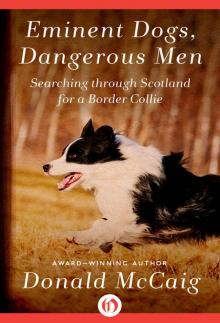 Eminent Dogs, Dangerous Men: Searching Through Scotland for a Border Collie
Eminent Dogs, Dangerous Men: Searching Through Scotland for a Border Collie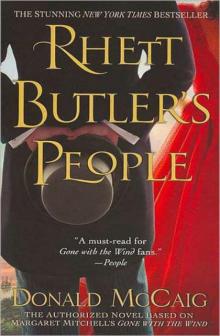 Rhett Butler's People
Rhett Butler's People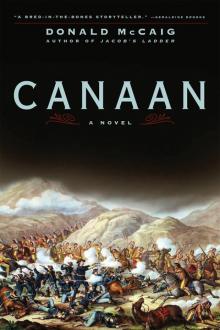 Canaan
Canaan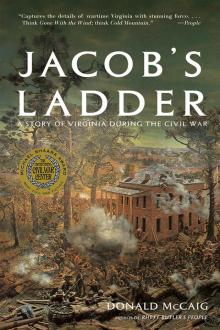 Jacob's Ladder: A Story of Virginia During the War
Jacob's Ladder: A Story of Virginia During the War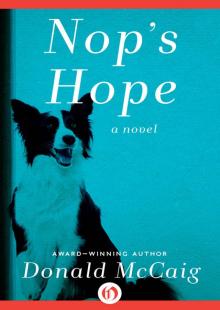 Nop's Hope
Nop's Hope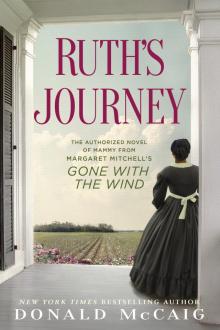 Ruth's Journey: The Authorized Novel of Mammy From Margaret Mitchell's Gone With the Wind
Ruth's Journey: The Authorized Novel of Mammy From Margaret Mitchell's Gone With the Wind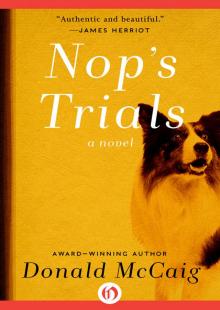 Nop's Trials
Nop's Trials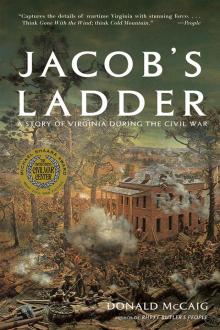 Jacob's Ladder
Jacob's Ladder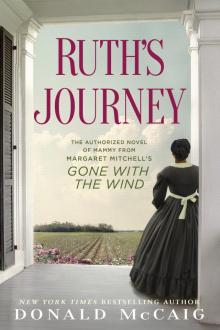 Ruth’s Journey
Ruth’s Journey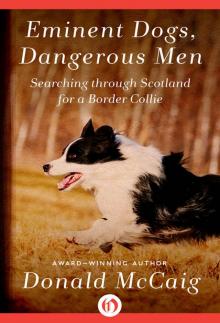 Eminent Dogs, Dangerous Men
Eminent Dogs, Dangerous Men